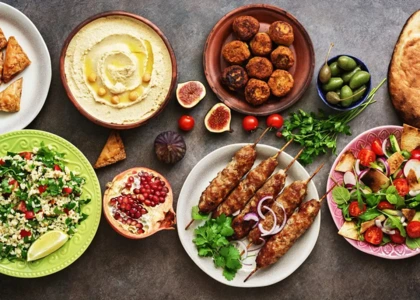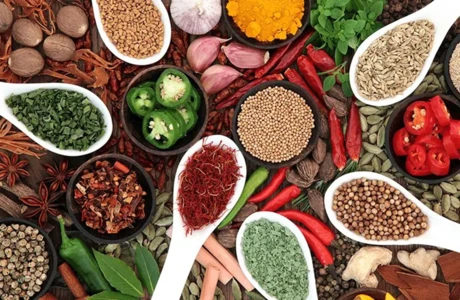Share
December 8, 2022
Turkish cuisine is a unique combination of flavors, spices, and herbs developed over thousands of years. The origin of Turkish food is rooted in the rich cultural, historical, and geographical influences from the various regions it has been exposed to. This has resulted in an incredibly diverse array of dishes and flavors that are not only delicious but also healthy and nutritious. From the famous kebabs to the street food culture, Turkish cuisine has something for everyone and is sure to tantalize your taste buds.
History
Turkish cuisine has its roots in the Ottoman Empire, which was founded in 1299 by Osman I. During this period, culinary influences from Central Asia, the Middle East, and the Mediterranean regions were blended to create a unique cooking style. This fusion created recipes that were both flavorful and healthy. In addition to regional influences, Turkish cuisine was shaped by religious dietary laws such as halal (permissible) foods and dietary restrictions such as vegetarianism or veganism.

Regional Influences
Over time, different regions within Turkey began to develop their unique styles of cooking based on local ingredients and traditions. For instance, the Black Sea region is known for its fish dishes, while Central Anatolia’s specialty is kebabs. Istanbul is renowned for its mezes (small plates), while Aegean coastal towns are famed for their seafood delicacies.
Ingredients
Common ingredients used in Turkish cooking include olive oil, onions, garlic, tomatoes, peppers, eggplants, and legumes such as chickpeas or lentils. Spices like cumin, coriander seed powder, chili flakes, and paprika are also frequently used to flavor dishes. Herbs like parsley and mint are often added for garnish or flavor enhancement.
Popular Dishes
You can find several amazingly delicious dishes. When it comes to popular dishes, several regions have their signature dishes, and some have variations as you move from one place to another. Despite the variations, some Turkish dishes are immensely popular all across the globe. Tourists come here not just for sightseeing but for their delicious food.

Some of the Popular dishes from Turkey include:
- Kebabs: It is grilled meats cooked on fire over skewers.
- Dolma: It is a unique dish. It is grape leaves stuffed with beef, rice, and herbs.
- Pide: Pide is a flatbread with toppings. It is light and tasteful.
- Manti: Ravioli-like dumplings.
- Kofte: Kofte or meatballs are made from lamb or chicken meat and are usually served with a sauce.
- Borek: It is a popular dish that is a savory pastry filled with cheese.
- Baklava: It is a popular middle eastern dessert that has its roots in Turkish cuisine as well. It is a sweet pastry.
Street Food
Street food plays an important role in Turkish culture; it’s a great way to experience local specialties without spending too much money or time at a restaurant. Popular street foods include simit (sesame-covered circular bread), gozleme (stuffed flatbread), lahmacun (Turkish pizza), and kokorec (spicy lamb intestines).

Dining Habits
Traditional dining habits involve eating several small meals throughout the day rather than large meals at regular intervals like breakfast/lunch/dinner. However, this trend is changing due to modern lifestyles. Meals usually begin with a soup followed by main courses served with side dishes such as salads or vegetable dishes called meze platters which can be shared among multiple people at the table. Desserts typically consist of pastries like baklava or seasonal fresh fruits like melon or pomegranate arils sprinkled over yogurt or ice cream.
Spices & Herbs
Spices play an important role in creating distinct flavors in Turkish cuisine; some commonly used spices include sumac powder made from dried berries, which adds tartness; Aleppo pepper flakes which give dishes a smoky flavor; za’atar, which combines thyme with sesame seeds; pul biber which adds heat; Baharat mix composed of seven spices including cardamom; allspice; nutmeg; cumin; cinnamon; cloves; black pepper etc.; Urfa Biber which gives dishes a smoky flavor without too much heat etc. Herbs such as parsley, oregano thyme, basil tarragon, dill mint rosemary bay leaf, etc., are also used to add flavor and aroma.

Use of Healthy ingredients
Turkish cuisine is known for its health benefits due to the use of fresh ingredients and spices. For instance, olive oil is a major component of many dishes and has been linked to reduced risk of heart disease. Legumes like chickpeas are high in fiber and protein, while vegetables like eggplants, peppers, and tomatoes are rich in antioxidants. Spices like cumin, coriander seed powder, chili flakes, and paprika contain anti-inflammatory compounds that can help reduce inflammation in the body.
Conclusion
Turkish cuisine is an incredibly diverse blend of flavors, spices, and herbs developed over thousands of years. With its wide range of dishes, street food culture, and health benefits, it’s no wonder it’s become so popular worldwide. Furthermore, restaurants serving Turkish cuisine can reap numerous business benefits by implementing rewards and loyalty programs that encourage customers to return more often. So if you’re looking for something new and delicious, look no further than Turkish food!
